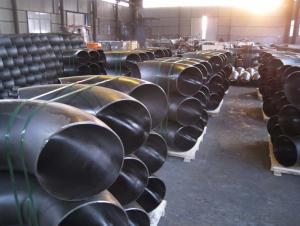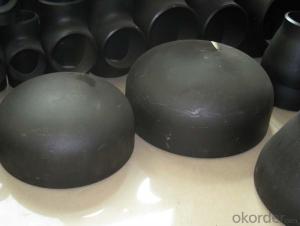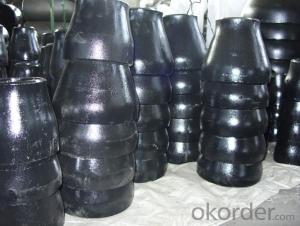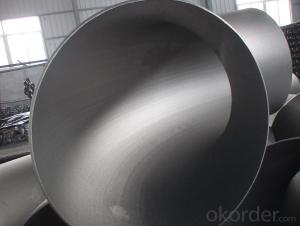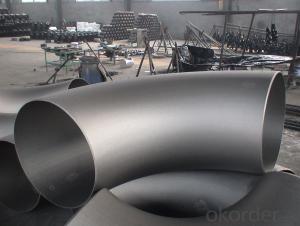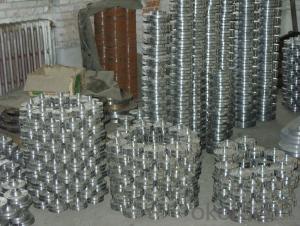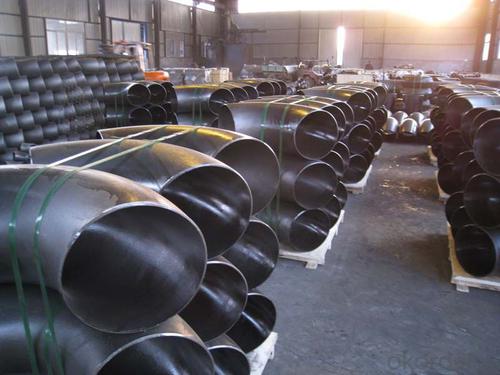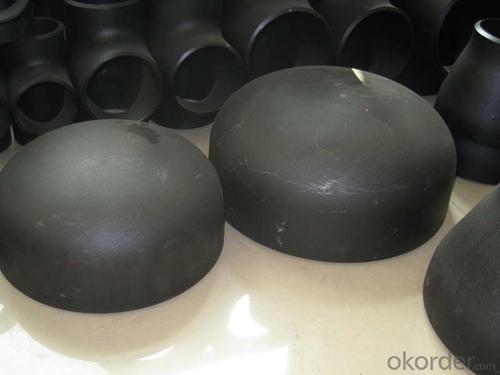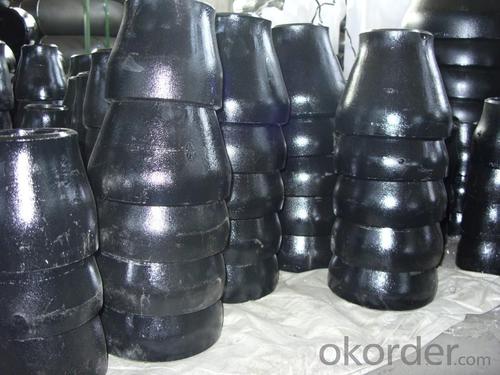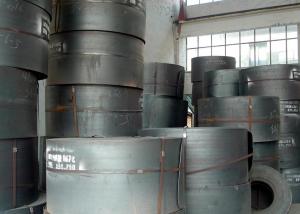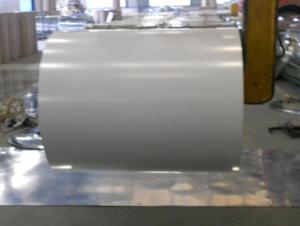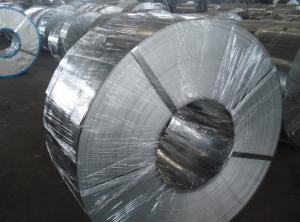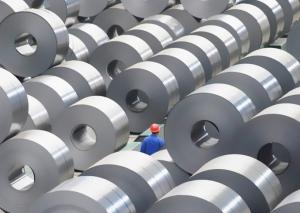Carbon Steel Pipe Fittings SA105 BEND 90DEG
- Loading Port:
- China Main Port
- Payment Terms:
- TT OR LC
- Min Order Qty:
- -
- Supply Capability:
- -
OKorder Service Pledge
OKorder Financial Service
You Might Also Like
Specifications
pipe fitting elbow
Certificate:ISO:9001-2000
New material,completely meet asme and din standard
Best price
1. type: AISI ASTM A234 WPB BW Con Elbow
2. Size: 1/2"-48"(1/2"-24"is seamless and 26"-48"is welded)
3. Wall thickness: sch10-160, STD, XS, XXS
4. Material: A234WPB, A420WPL6, A420WP5, WP11, WP12, WP22, etc
5. Welding line: seamless
6. Angle of bend: 30, 45, 90, 180degree
7. Bending radius: SR, LR
8. Standard: ANSI B16.9, JIS, SB, DIN, GB
9. Surface treatment: black paint, vanis paint, black rust-proof oil,
transparent oil, hot galvanizing
10. Application: petroleum, electricity, chemical, natural gas, metallurgy,construction,
shipbuilding and other fields because of its high pressure, high temperature, etc
11. connection: welding
12. technics:forged
13.Certificate:ISO9001 - 2000, CE, SGS, etc.
14. packaging: wooden case, pallet, container or in accordance with the
requirement of customers
15. Principle: quality fist, customer first, credit first
16. payment: L/C T/T
17. delivery time: 7-25 days after payments
18. Notes: the bevel can be made in accordance with the special requirements
of the customers
19. Others: we can also produce the products according to the requirements
of the customers
The main production:
1. PIPE FITTINGS: elbows, tees, bends, reducers, cap, flanges and sockets etc.
2. PIPE: bult welded pipes, seamless pipes, threaded pipes, etc.
We sincerely welcom customers at home and abroad to visit us and seek common development.
- Q: What are the uses of steel in the construction of schools and universities?
- Steel is widely used in the construction of schools and universities due to its superior strength and durability. It is commonly used in structural components like beams, columns, and frames, providing stability and support to the buildings. Additionally, steel is fire-resistant, making it a safe choice for educational facilities. Its versatility allows for flexible designs, accommodating various architectural styles and adapting to changing needs. Moreover, steel construction is efficient, reducing construction time and costs, while also being environmentally friendly as it is recyclable. Overall, steel plays a crucial role in ensuring the safety, longevity, and functionality of schools and universities.
- Q: How are steel products used in the construction of theme-based science discovery centers?
- Steel products are commonly used in the construction of theme-based science discovery centers for various purposes. Steel is strong, durable, and versatile, making it an ideal material for creating the framework and structural elements of these buildings. It is used to construct the framework of the building, including columns, beams, and trusses, which provide support and stability. Steel is also used in the construction of stairs, escalators, and elevators, ensuring safe and efficient vertical transportation within the center. Additionally, steel is used in the fabrication of roofing systems, wall panels, and facade elements, providing weather resistance and aesthetic appeal. Overall, steel products play a crucial role in the construction of theme-based science discovery centers, contributing to their durability, safety, and architectural design.
- Q: What are the factors to consider when choosing the right steel product for a specific application?
- When choosing the right steel product for a specific application, several factors need to be considered. These factors include the required strength and durability, corrosion resistance, cost-effectiveness, ease of fabrication and installation, availability, and environmental impact. Additionally, factors such as weight, aesthetics, and compatibility with other materials or systems may also play a role in the decision-making process. Overall, understanding the specific requirements of the application and evaluating the various characteristics of different steel products is crucial in making an informed choice.
- Q: How is steel used in the production of HVAC systems and equipment?
- Steel is used in the production of HVAC systems and equipment due to its durability, strength, and heat resistance properties. It is commonly used for manufacturing ductwork, air handling units, coils, and various components of the HVAC system. Steel ensures the structural integrity of the equipment and provides a reliable and long-lasting solution for heating, ventilation, and air conditioning systems.
- Q: What are the advantages of using stainless steel in the food and beverage industry?
- One of the main advantages of using stainless steel in the food and beverage industry is its excellent resistance to corrosion. This means that stainless steel equipment and surfaces are less likely to rust, stain, or corrode when exposed to various substances commonly found in the industry, such as water, acids, and food ingredients. Additionally, stainless steel is easy to clean and maintain, as it is non-porous and does not absorb dirt, bacteria, or odors. This makes it a hygienic choice for food processing and handling. Moreover, stainless steel is durable and can withstand high temperatures and mechanical stress, making it suitable for a wide range of food and beverage applications.
- Q: What are the different types of steel wires and their applications in the automotive industry?
- There are several types of steel wires used in the automotive industry. High carbon steel wires are commonly used for making springs, such as suspension and engine valve springs, due to their excellent strength and durability. Stainless steel wires are used for applications that require resistance to corrosion and high temperatures, like exhaust systems and fuel injection lines. Galvanized steel wires, which are coated with zinc, are used for various automotive applications, including wire harnesses and reinforcements. Lastly, piano wire, a high tensile steel wire, is used for applications that require high strength and precision, such as control cables and seat frames.
- Q: What are the applications of alloy steel in manufacturing?
- Alloy steel is widely used in manufacturing due to its exceptional properties and versatility. It is utilized in various applications such as the production of machinery, automotive parts, tools, construction materials, and even in the aerospace industry. The high strength, durability, and resistance to corrosion and wear make alloy steel ideal for manufacturing components that require high tensile strength, toughness, and the ability to withstand harsh environments. Additionally, alloy steel can be easily machined, welded, and heat-treated, allowing for greater flexibility in the manufacturing process.
- Q: How is steel used in the production of kitchen utensils and cookware?
- Steel is commonly used in the production of kitchen utensils and cookware due to its durability, heat conductivity, and corrosion resistance. It provides strength and stability to utensils like knives, spatulas, and tongs, ensuring they can withstand regular use and maintain their shape. Additionally, stainless steel, a specific type of steel, is often used for pots, pans, and baking sheets due to its excellent heat distribution and non-reactive properties with food, making it ideal for cooking.
- Q: What are the different types of steel rails and their applications?
- There are several types of steel rails commonly used in various applications. Some of the most common types include: 1. Light rails: These rails are typically used in light-duty applications, such as tramways, narrow gauge railways, or temporary tracks. They are relatively lightweight and offer flexibility for installation and maintenance. 2. Heavy rails: Heavy rails are designed for high-load applications, such as mainline railways or heavy industrial tracks. They are more robust and can withstand heavy traffic and large loads over long distances. 3. Crane rails: These rails are specifically designed for crane tracks and overhead cranes. They are constructed to handle the dynamic loads and stresses imposed by cranes, ensuring smooth movement and stability. 4. Grooved rails: Grooved rails are commonly used in urban transit systems, such as trams or light rail vehicles. They have a groove along the top surface that guides the wheels, providing additional stability and preventing derailments. 5. Flat-bottomed rails: These rails are widely used in standard railway tracks. They have a flat base that rests on the sleepers, providing stability and support for heavy trains. Flat-bottomed rails are typically used in mainline railways and high-speed tracks. 6. Switch and crossing rails: These rails are used at railway switches and crossings, where trains can change tracks or cross paths. They are designed with specific profiles to ensure smooth transitions and safe operations for trains. The applications of these steel rails vary depending on the specific type and its characteristics. However, they are crucial components in the construction of railway systems, tramways, industrial tracks, and crane tracks, providing the necessary support and stability for efficient and safe transportation of goods and passengers.
- Q: What are the different types of steel angles and their applications in the manufacturing of machinery?
- There are several different types of steel angles used in the manufacturing of machinery. Some common types include equal angles, unequal angles, and angle irons. Equal angles have equal sides and are often used for structural applications such as framing and support beams in machinery. They provide stability and strength to the structure. Unequal angles have one longer side and one shorter side, which makes them suitable for applications where a specific angle or slope is required. They are commonly used in machinery to create inclined surfaces or to provide clearance for moving parts. Angle irons are L-shaped and have equal or unequal sides. They are versatile and commonly used in machinery for various purposes such as bracing, connecting, and supporting components. Angle irons can also be used as corner guards and reinforcements. Overall, steel angles play a crucial role in machinery manufacturing by providing structural support, creating specific angles, and enhancing stability and durability of the machinery.
Send your message to us
Carbon Steel Pipe Fittings SA105 BEND 90DEG
- Loading Port:
- China Main Port
- Payment Terms:
- TT OR LC
- Min Order Qty:
- -
- Supply Capability:
- -
OKorder Service Pledge
OKorder Financial Service
Similar products
Hot products
Hot Searches
Related keywords
